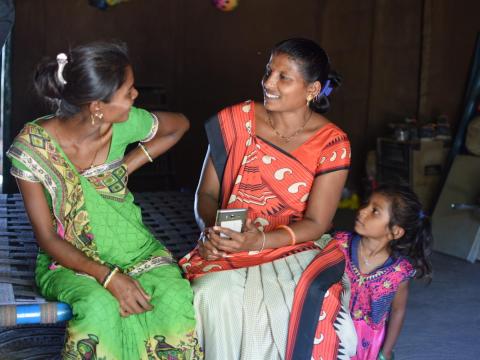2020 Digital Health Factsheet: Sierra Leone
DownloadWorld Vision Sierra Leone has accumulated significant experience with digital health programming. Two projects have been active since 2015 in collaboration with national and local government through a multi-stakeholder approach:
The AIM Health Plus project in Sierra Leone provides community health workers (CHWs) in Imperi district and Sherbro Island with smartphones equipped with a tailored version of Dimagi’s CommCare software to use during their home visits. The application supports CHWs who are using the Timed and Targeted Counselling (ttC) approach to promote positive health and nutrition behaviour change among pregnant women and mothers or caregivers of children under 2. The application provides reminders to help CHWs to visit homes at the ideal time during pregnancy, infancy and childhood. It also supports CHWs as they conduct counselling sessions, including enabling them to submit community health data in near real time. This data is then used for planning and decision-making. To boost acceptability of this digital health tool, local language audio clips are incorporated into the application. This digital health intervention is expected to improve the effectiveness of behaviour change communication delivered to women and caregivers of children under 2 as well as strengthen the health system though better use of community-level data.
The AIM Health Plus project is supported by Irish Aid.
***
The Ebola Vaccine Deployment Acceptance and Compliance (EBODAC) project supports the acceptance and uptake of new Ebola vaccines. The project’s communication and community engagement strategy includes using appropriate technology to maximise acceptance and therefore impact of an Ebola vaccination programme. EBODAC is currently supporting the Ebola vaccine trial (EBOVAC-Salone) in locations in Sierra Leone, Uganda, Democratic Republic of Congo, and Rwanda to ensure that the novel prime-boost vaccine regimen is well accepted and successfully deployed.
The digital health innovation, called Mobile Training and Support Service (MOTS) and built on the Grameen Foundation’s MOTECH platform, aims to strengthen networks of front-line health workers and ensure epidemic preparedness, including support for Ebola vaccine campaigns. While initially designed to train CHWs to support vaccine-related programmes, the MOTS system was readily repurposed as part of the COVID-19 response in 2020. This has alleviated the re-training challenge that the health system faced in responding to the COVID-19 pandemic.
The EBODAC project is supported by the Innovative Medicines Initiative and Janssen Pharmaceutical of Johnson & Johnson.
